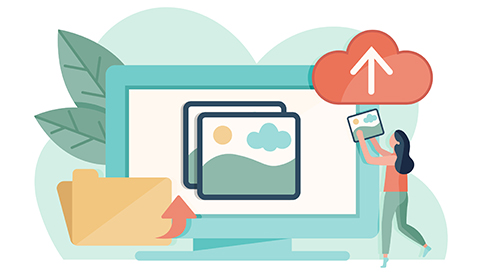How to Secure Your Website From Hackers
Cybercrime continues to be a serious threat to businesses. As e-commerce transactions become more common these days, hackers are looking for more sophisticated ways to steal sensitive information from websites. According to Tech Jury, more than 30,000 websites are hacked each day. While large companies invest a lot in their cyberdefenses, small businesses remain the most vulnerable to data breaches and identity theft. If you are running a website to support the online presence of your small business, it’s important to know how to secure your website from cybercriminals. Here are a few tips to help you get started on the road to better cybersecurity.
How to Secure Your Website from Hacking – Learn the Latest Threats
Before anything else, it’s important to identify what your website is up against. Improving your defenses starts with knowledge and awareness. You will need to learn about the techniques and tools that modern hackers use to gain access to the backend. Not only that, but your web development team must also look up the latest trends in cybersecurity for small businesses.
Stay current with the latest threats and invest in the right defenses. Check out websites like The Hacker News and Security Weekly for news and insights on the state of cybercrime. You can also follow the Twitter feeds of experts like Brian Krebs or Graham Cluley so you are always ahead of everyone else when it comes to preparing against the latest forms of hacking.
How to Secure Your Website – Acquire for an SSL Certification
Websites are required to follow international regulations on the acquisition and storage of client data. In particular, businesses are required to use data encryption to prevent hackers from stealing sensitive information. For this, your website has to have an SSL certificate. As a standard component in online security, an SSL certificate helps secure communications with customers by scrambling pieces of data so hackers won’t read them.
Apart from that, an SSL certificate can help your business build trust. Without one, your website could be flagged as suspicious by search engines like Google. It doesn’t take a long time to set up an SSL certificate, so it’s best that you get one and improve your website’s defenses against hackers and give your customer peace of mind.
Look for a Quality Hosting Service
If you are using your website for generating sales, you need to find a good hosting service to help set everything up. Apart from giving you a certain amount of control for customizing your website, a hosting service can also help secure your website from hackers and data saboteurs. There are a lot of hosting services to choose from, but when it comes to protecting customer data, you are better off paying extra for extra layers of security. When you are looking for the best web hosts, it would be best to settle for one that offers ease of access and high levels of transparency.
Some providers also offer virus and malware scanning as part of a package. Others can also provide you with an effective file transfer protocol. This ensures that the files that are uploaded to your website are safe. You will find a file transfer protocol helpful if you are uploading large amounts of content and informational resources. Lastly, you need to make sure that the web host you are dealing with is always available for urgent questions. You will want someone who can provide an immediate response to security-related issues.
How to Secure Your Website – Restrict Backend Access
A common way for hackers to enter your website is by gaining access to login credentials. Passwords and usernames are always at risk of falling in the wrong hands, so it’s important that your web development team is able to secure these. For this, make sure everyone uses unique and complicated passwords. Content management systems such as WordPress require passwords to include mixed-case letters, numbers, and special symbols.
It’s also important to avoid storing passwords in the browser or a physical item such as a sticky note. You can always use a password management solution to help you autofill password fields and share login information with other members of your team securely. Strict gatekeeping is also crucial to protecting the backend from unauthorized access. The only people who should have administrator access include you and members of your web development team. Limiting high-level access to only a few people in your team should prevent costly breaches that do not hurt your reputation but also affect your customers directly.
Use the Right Plugins
As you build your website, you will need to identify the right security plugins to install. These will form the first layer of defense against any attempt to hack, steal, or alter sensitive data. When picking a security plugin, make sure you choose one that protects against hackers as well as malware. There are plenty of plugins that provide all-in-one security solutions for safeguarding customer data and critical information about your business.
If you are using WordPress, Sucuri is one of the best options to consider. It can prevent distributed denial-of-service attacks, SQL injections, and cross-site scripting attacks. For added measure, the plugin also comes with a malware scanning feature. If your website requires customers to log in, you will need to protect their accounts from hackers. You can’t always rely on your customers to create complex passwords themselves.
Hackers are also using special software that allows them to test different password combinations. So your customers are always at risk of getting hacked. Fortunately, you can defend users against brute force strategies by installing plugins such as Limit Login Attempts Reloaded. This allows you to limit the number of login attempts and locks an account when the limit is reached. Considering the kind of information you require from your customers, your website has to be equipped with the right tools to protect such information from cybercriminals.
How to Secure Your Website – Keep Everything Updated
For many, updating individual tools and plugins comes off as unimportant. But the threats to online security and privacy are evolving. Your website has to be equipped with up-to-date tools that can address the latest tools and strategies that hackers are using. Keeping your website up-to-date must be a part of your web maintenance activities. Updates come with security patches that are designed to address vulnerabilities.
Unless you are using a managed web hosting service, you may have to update your software yourself. Either way, you need to have the latest tools in your arsenal, especially if you are handling sensitive customer data such as credit card numbers, birthdays, and answers to security questions.
Monitor Your Activity Log
The activity log serves as your digital security camera. Regardless of the number of people maintaining your website, you will need to track who is logging in and when. Every movement or alteration must be accounted for, so you will need to review your log every now and then to monitor suspicious backend activity. If you see any major changes to your website configurations, you will have to check with your web development team if the changes came from them. Otherwise, you will need to put your website on lockdown and provide everyone with new login credentials.
Cybersecurity is a serious matter, and hacking has cost businesses (even large corporations) millions of dollars in losses. Don’t let the same happen to you. Apply these tips and give yourself and your customers peace of mind.




Leave a Reply